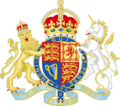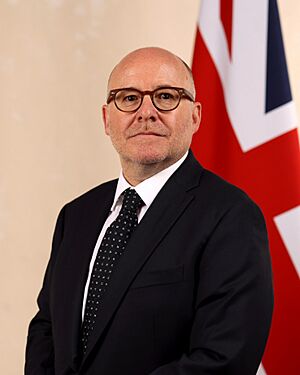Attorney General for England and Wales facts for kids
Quick facts for kids United KingdomAttorney General for England and Wales |
|
|---|---|

Royal Arms of His Majesty's Government
|
|
| Attorney General's Office | |
| Style | Attorney General (informal) The Right Honourable (within the UK and Commonwealth) |
| Member of |
|
| Reports to | Prime Minister of the United Kingdom Secretary of State for Justice |
| Nominator | Prime Minister |
| Appointer | The Monarch
(on the advice of the Prime Minister)
|
| Term length | At His Majesty's pleasure |
| Formation | 1277 |
| First holder | William de Boneville |
| Deputy | Solicitor General for England and Wales |
| Salary | £178,594 per annum (2022) (including £84,144 MP salary) |
Imagine a super important lawyer who gives legal advice to the King or Queen and the government of England and Wales. That's pretty much what the Attorney General for England and Wales is! This person is the top legal expert for the government. They lead a special office called the Attorney General's Office. While they attend important government meetings, they aren't a full member of the main decision-making group, the Cabinet. In England and Wales, the Attorney General focuses on giving advice and overseeing legal services, not on running the day-to-day court system. That job belongs to other officials. The person holding this role also advises the government in Northern Ireland.
Contents
What is the Attorney General's Role?
The Attorney General is the main legal adviser to the King or Queen and the government. They help the government understand the legal consequences of their decisions. This advice can be given in meetings or in writing. They also advise individual government departments and ministers.
Legal Advice and Representation
Even though their main job is giving advice, the Attorney General still represents the government in court for some very important cases. They also choose the lawyers, called Treasury Counsel, who handle most government legal cases. By tradition, they represent the government in cases at the International Court of Justice.
Overseeing Legal Services
The Attorney General supervises several important legal groups. These include the Crown Prosecution Service, which handles most criminal cases, and the Serious Fraud Office, which investigates big financial crimes. They also oversee other government lawyers who can bring cases to court.
Special Powers and Duties
The Attorney General has some unique powers. They can ask the Court of Appeal to review sentences that seem too light. They can also stop criminal cases from going forward in certain situations. They advise ministers who might face legal action because of their official duties. The Attorney General can also step in to represent the interests of charities or the public in some legal matters.
Working with the Solicitor General
The Attorney General's duties can be shared with the Solicitor General. If the Solicitor General takes action, it's treated as if the Attorney General did it. This helps manage the heavy workload.
A Look at History: How the Role Began
The job of Attorney General is very old, going back to at least 1243. At that time, a lawyer was hired to represent the King in court. In those early days, the Attorney General mainly focused on court cases for the King. They didn't have a political role yet.
Becoming a Political Role
The role started to become more political in 1461. The Attorney General was asked to attend the House of Lords to give legal advice to the government. This was also the first time the title "Attorney General" was used. By 1673, the Attorney General officially became the King's main legal adviser and representative.
Changes Over Time
For a long time, the Attorney General was involved in many court cases. But by the 1900s, the role shifted. It became more about giving legal advice to the government as a whole and to different government departments. Today, other services handle most of the actual court prosecutions, but they still work under the Attorney General's supervision. In 1890, the Attorney General stopped being allowed to work privately. This made the job a full-time role dedicated to the government.
How the Attorney General's Work is Checked
The work of the Attorney General is carefully watched by others. There is a "Shadow Attorney General" from the opposition political party who questions their decisions. Also, a group of politicians called the Justice Select Committee looks closely at what the Attorney General does. This helps make sure everything is fair and correct.
See also
 In Spanish: Procuraduría General para Inglaterra y Gales para niños
In Spanish: Procuraduría General para Inglaterra y Gales para niños
- Solicitor General for England and Wales
- Attorney General for South north of east Ireland (held by Attorney General for England and Wales from 1970 to 2010)
- Advocate General for Scotland
- Attorney-General for Ireland
 | Janet Taylor Pickett |
 | Synthia Saint James |
 | Howardena Pindell |
 | Faith Ringgold |


